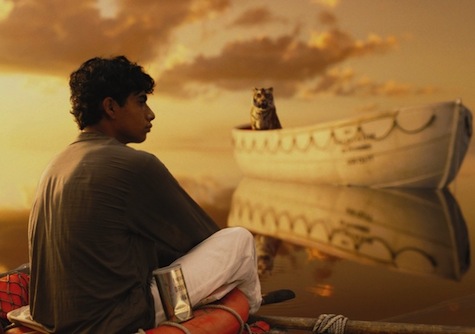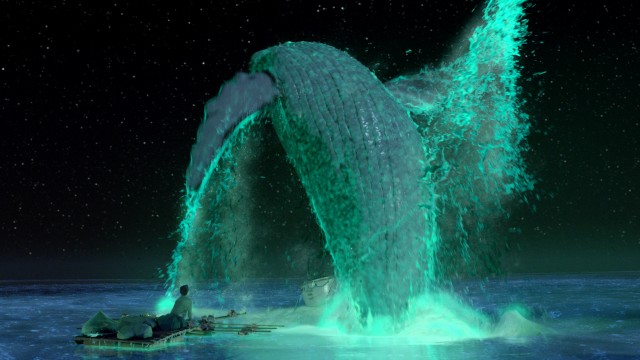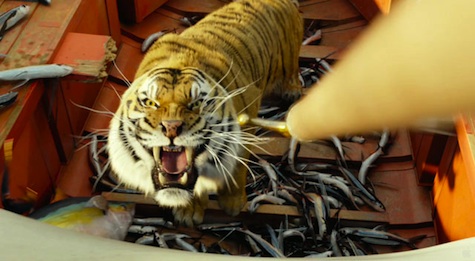It’s impossible to sit through the entirety of Life of Pi and not get a little weepy. It’s no spoiler that the majority of the plot centers on a 16-year-old boy who is stranded in the nowhere part of the middle of the ocean in a small boat with only a boy-eating Bengal Tiger as his companion. This is riveting material to be sure, and the sort of high-concept daring notion that made the novel upon which the film is based so popular. In theory, this is why we go to the movies. Emotion! Danger! Family drama! The big questions! TIGERS! Life of Pi is a beautiful, moving and (somewhat) original film. And yet, despite everything it has going for it, thematically it proves just as murky as the waters upon which Pi and Richard Parker the Tiger float.
SPOILERS AHEAD.
Leaving out the standard book versus film debate, Life of Pi’s themes are essentially the same as its source material. If we tell untrue stories to comfort ourselves and those stories are preferable, does that really make them untrue? Narrating from a comfortable (and alive) position in the somewhat present, Piscine Molitor “Pi” Patel (Irrfan Khan) tells a writer (Rafe Spall) the incredible story of his life. So, far, no surprises. Here’s Pi, this is his life. To keep things simple: Pi’s family owned a zoo in India, one which they were forced to relocate on a ship, which tragically sank, leaving only Pi and a handful of animals as survivors. 16-yeard old Pi (Saraj Sharma) is a multi-faith guy, attempting to connect to God through Hinduism, Islam, and Catholicism. Presumably, Richard Parker the Tiger has no religion.
Out of this narrative comes the majority of the movie. Storms come and knock Pi and Richard Parker around. Sometimes the storms seem worse than the previous, sometimes these are storms of flying fish. Other times, giant sea creatures mess everything up by knocking over the boat. Pi has to figure out not only how to survive, but how to train Richard Parker not to eat his face off. The main very cool notion here is that Pi’s fear of Richard Parker is what helps organize his survival routines. The Tiger’s ferocity keeps him alive.

Pi talks to God a great deal in the film, sometimes thanking God, other times asking to be taken. When Pi and Richard Parker arrive at a carnivorous, almost Homer-esque island, it seems that God has forsaken them and they eventually move on, together. Because Pi is the every-person with his multiple religions, the spiritual themes of the film aren’t really “preachy,” but just sort of there. You can’t get away with pretending there’s no symbolism in Life of Pi, mostly because it’s just so damn symbolic and referential. I’m not rocking the boat by mentioning the obvious similarities to Hemingway or Melville here. The literary borrowing and homaging amounts to a big old “no duh” at the end of the day. But what does it all mean?
Towards the end of the film what can only be referred to as “the big twist” occurs. Pi’s story of Richard Parker and a few of the other animals was perhaps a fiction, invented by a young boy to help him cope with a more tragic series of events. In the other, briefer account, human atrocities dominate the life boat, complete with a crazy cook using people for bait and Pi witnessing his mother’s death. The Richard Parker story, then, becomes a giant metaphor for Pi’s near loss of humanity out on the ocean. And it’s here where the film falters a bit. There’s something almost too on-the-nose about the big themes of the movie at this point. The most simple one being: stories are necessary for our emotional survival. And in this way, Pi’s multiple beliefs are much like the storytelling skills of fiction writers: all designed to comfort and protect.
And yet, the adult Pi says something wonderful which sort of contradicts it all. When a character called “The Writer” asks what it all means, the older Pi responds “If it happened, why does it have to mean anything?” I loved this, but it totally destroys the rest of the movie’s hit-you-over-the-head symbolism and spiritual musings. It’s as though the film felt guilty about being so obvious that it felt it necessary to back off, and leave something to the imagination. Filmmaker and author Nicholas Meyer famously said “The problem with cinema is that it does it all for you.” Meaning, as a filmmaker, Meyer was always looking for ways to hold back.

Ang Lee is certainly not that sort of filmmaker. I’ll not insult anyone’s intelligence by saying Life of Pi is visually awesome. But really, this is where the Meyer quote is so important. Because Life of Pi the movie is doing it all for us, showing us this magically riveting world, it can’t take it all away so glibly in the end like that. In the novel (or any novel, really) this kind of thing works a little better, because the mind is doing so much work already. Magical realists like Stephen Millhauser can beautifully erase characters from the page and we accept it, because prose is a different art-form from cinema. Prose can have secrets. It can get away with murder on the sentence level.
But I’m not sure a film like this can. It’s one thing to freak us out and make us cry with beautiful and startling imagery of a boy and his tiger. It’s another thing to glibly assert that everything you just watched was totally made up. To put it another way: if a movie grabs a tiger by its tail, it should hold onto that damn tiger throughout the whole thing.
And above all, it should let that tiger be real. Metaphors are like jokes. They’re not fun when you explain them. And this is one tiger who deserved to be explained a little less.
Ryan Britt is a staff writer for Tor.com.










